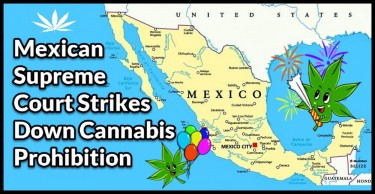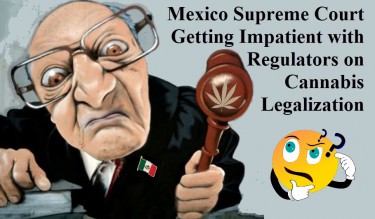
How Mexico’s Supreme Court Vote to Lift the Cannabis Ban Can Help American Legalization Efforts
Mexico’s Supreme Court Moves To End Marijuana Prohibition Itself After Lawmakers Fail To Act
A few years ago the world became aware when the Mexican Supreme Court ruled that “the ban on cannabis is a violation of the Mexican Constitution”.
Why?
Because unlike many other places that legalize cannabis, few of them have made it a constitutional right. In Mexico, the constitution is actually one of the most “liberal” when it comes to individual freedoms.
Unlike the US Constitution, the Mexican Constitution contains a section that gives every Mexican the constitutional right to “develop their personality” as they see fit.
In other words, the government cannot tell you how to express yourself on questions of personality and self-identity.
And so a bunch of shrewd lawyers launched a few legal proceedings seeking “legal protection” to be prosecuted for growing and using cannabis, arguing that cannabis culture was part of their “personality”.
The Supreme Court agreed, and after five votes for this type of “Amparos”, Mexican law is clear that a constitutional change must be made.
That declaration of the law’s unconstitutionality came in 2019, and the Supreme Court ordered lawmakers to establish the legal framework for regulating, growing cannabis, etc.
Legislators failed to meet the first deadline, then the next, and then the next, and in the last two years the details of “legal cannabis” in Mexico could not be specified.
The Supreme Court has decided on many extensions, but on Monday, June 28, 2021, the Supreme Court will discuss again whether to lift the cannabis ban in Mexico or give lawmakers more time to complete the regulations.
What if the Mexican Supreme Court votes to end the ban?
If eight of the twelve Supreme Court justices vote to abolish the cannabis ban, it will become a constitutional right for every Mexican, regardless of age.
It would essentially make all laws against cannabis unconstitutional, meaning cannabis laws would have no legal weight.
As you can imagine, this would create a whole world of irregularities in the market.
First, there would be “no law,” which means there would be no protection either. Law enforcement agencies would still technically be able to harass and blackmail people for their cannabis use (which is pretty common in Mexico).
However, in the same vein, all forms of cannabis would actually be a constitutionally protected activity. That means there would be no limit to the number of plants you could grow at home, whether or not they could be sold.
Although the Supreme Court does not want to create a lawless system within cannabis, they are forced to act by their own decree.
You have given the Senate and the Chamber of Deputies several extensions, but due to the constant refinement of the laws, the legislature was unable to reach a conclusion.
This is forcing the Supreme Court to simply legally end the ban and leave everyone in a “Wild West” scenario.
What happens in an unregulated Mexico?
It wouldn’t go unregulated for long. Should the Supreme Court vote to abolish the cannabis ban, lawmakers would still be charged with developing a system – except that every day they stall now would mean unregulated activity can flourish.
This means that the legislature could react quickly to a decision that may not be optimal. After all, the legislator stated that the reason for the standstill was to create a fair and well-regulated cannabis market while respecting the rights of indigenous farmers and communities with limited resources.
Legislators almost agree with their current plan, but activists objected to several provisions – most notably the need to register with the “National Center for Addiction” in order to obtain a permit to grow cannabis.
This directly violates “constitutional rights”. After all, your freedom of expression does not require you to “register with the Propaganda Department” in order to enjoy your full rights. A constitutional right guarantees certain rights – and when you register to exercise a right, you instantly turn it into a “privilege” rather than a right.
However, this is just one of the problems activists have seen.
Others include treating minority communities, ensuring fair market practices, health regulations, vertical integration, and a number of other issues.
What’s happening now?
Monday June 28, 2021 could be the day Mexico actually lifts the ban from its books. While this would not allow the legal market to flourish, it would not allow goods to be imported or exported, but it would be a great victory for activists around the world.
Knowing that there is a country where cannabis use is a constitutionally protected right should give other countries the blueprint for legalization.
Of course, the Mexican constitution is one of the “most permissive constitutions” in the world. You wouldn’t believe that this is because of the way the government works, but the truth is that even in the US you don’t have a “right to exercise personality.”
Of course, this is stipulated in the US Constitution, but the Mexican document explicitly made it anchored in the Constitution. This makes it a real point of contention and was exactly the mechanism savvy activists used to circumvent the ban. Recently, US Supreme Court Justice Clarence Thomas denounced the US federal government’s legal marijuana policy and that change must be made.
What comes next is the world will wait for the Supreme Court to deliberate and deliver its verdict. If the Supreme Court votes to end the ban, lawmakers will likely pass legislation very quickly.
If the Supreme Court approves another extension, maybe we can bring a working cannabis system to light sometime in September.
For my part, I hope the Supreme Court will simply abolish the cannabis ban. We need to set a legal precedent for cannabis to be a human right – the right to free choice.
TO UPDATE:
I was about to submit this article to the editor when the news came that the Mexican Supreme Court had indeed voted to lift the cannabis ban in Mexico.
Now the health minister has to issue permits for the cultivation, but the Mexican ban on cannabis use officially ended on June 28, 2021.
MORE ABOUT MEXICO’S SUPREME COURT READ THIS …

THE MEXICAN SUPREME COURT OF JUSTICE IS BANING CANANBIS!
OR..

HOW THE MEXICAN SUPREME COURT OF JURISDICTION was fed up with LAWMAKERS!

Post a comment: